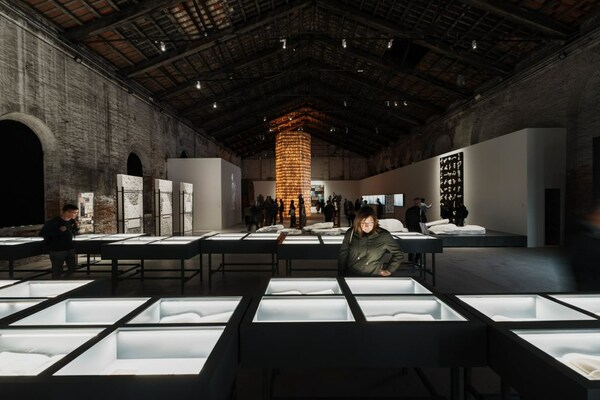HANGZHOU, China, April 23, 2024 /PRNewswire/ — The China Pavilion at the 60th International Art Exhibition (La Biennale di Venezia) organized by Ministry of Culture and Tourism of the People’s Republic of China, embraces the theme “Atlas: Harmony in Diversity,” curated by Wang Xiaosong and Jiang Jun. It is structured into two sections: “集 (Collect),” showcasing imagery archives sourced from “A Comprehensive Collection of Ancient Chinese Paintings,” and “传 (Translate),” spotlighting works by seven Chinese contemporary artists: Che Jianquan, Jiao Xingtao, Qiu Zhenzhong, Shi Hui, Wang Shaoqiang, Wang Zhenghong, and Zhu Jinshi.
Theme of the China Pavilion—Atlas: Harmony in Diversity
The China Pavilion embraces “Atlas: Harmony In Diversity” as its theme, with a focus on the concepts of gathering, exchanging, and integrating, aiming to convey the values of embracing inclusivity, coexistence in unity, and shared beauty with diversity from traditional Chinese culture. In particular, “atlas” symbolizes the convergence of diverse identities, races, beliefs, ideas, purposes, backgrounds, and cultures worldwide, fostering opportunities for dialogue, communication, and mutual understanding.
In “Collect,” digital archives of 100 Chinese paintings scattered overseas will be displayed in archive cabinets and on LED screens. These works are part of “A Comprehensive Collection of Ancient Chinese Paintings,” a project spanning 19 years and comprising 12,405 pieces/sets of ancient Chinese painting treasures, over 3,000 of which are housed in institutions outside China, accounting for a quarter of the total works recorded.
Meanwhile, “Translate” features seven Chinese contemporary artists who engage in new creations inspired by the “A Comprehensive Collection of Ancient Chinese Paintings,” exploring various traditional Chinese painting elements, encompassing architecture, landscapes, figures, and flora and fauna. This not only reflects the cultural amalgamation of traditional Chinese literati but also emphasizes the inheritance bridging tradition and contemporary art.
Between “Collect” and “Translate,” the exhibition draws inspiration from “Mnemosyne Atlas” by 20th-century German art historian Aby Warburg, using image documentation to compile thematic plates for each artwork. It seeks to forge a connection between traditional Chinese paintings and contemporary art through the juxtaposition of diverse images, while also resonating with global image history, creating a dual linkage between Chinese and foreign, past and present.
The exhibition is scheduled to run from April 20 to November 24, 2024 (with a preview held from April 17 to 19) at the Arsenale in Venice, Italy.
View original content to download multimedia: Read More
